Original Article:
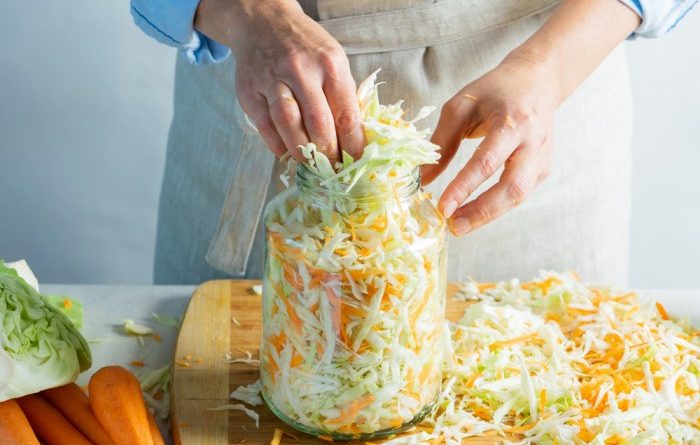
Whether you realize it or not, sauerkraut is a superfood that is really good for you! As preppers, we stockpile a lot of canned and processed foods. However, eating processed foods long-term isn’t a good source of vitamins and nutrients that our body needs. That’s why I think it’s a great idea to stock sauerkraut, as well as other superfoods. Printable recipe below, enjoy.
Things You May Need
- Cutting Board
- Quart Mason Jars
- Crock
- Knife
What is Sauerkraut?
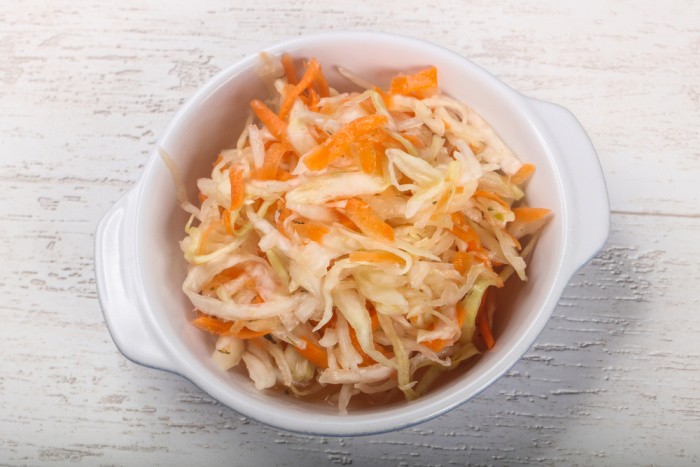
Sauerkraut is a type of fermented cabbage. We believe it originated in China more than 2,000 years ago. Fermentation was a popular way of keeping foods from spoiling quickly. It’s a popular side dish and condiment in many cultures. And, due to its fermentation process, sauerkraut offers a variety of nutrition and health benefits that a regular head of cabbage just can’t give.

Stock Sauerkraut for the Health Benefits
Sauerkraut was stored by our grandparents because it is easily stored for up to 2-years without refrigeration and has a variety of health benefits. I DO NOT recommend storing it without refrigeration, for safety reasons. I store mine in the refrigerator. When you eat only canned and processed foods, you need something that restores your gut health. Sauerkraut is loaded with nutrients, including probiotics and enzymes, that help you get more nutrients out of every meal. Here are some of the health benefits of sauerkraut:
It Contains a Variety of Nutrients
During the fermentation process, microorganisms digest the cabbage’s natural sugars and convert them into carbon dioxide and organic acids. Thus, making sauerkraut super nutritious. One cup of it contains the following:
- Calories: 27
- Fat: 0 grams
- Carbs: 6 grams
- Fiber: 4 grams
- Protein: 1 gram
- Sodium: 41% of the Daily Value (DV)
- Vitamin C: 23% of the DV
- Vitamin K1: 15% of the DV
- Iron: 12% of the DV
- Manganese: 9% of the DV
- Vitamin B6: 11% of the DV
- Folate: 9% of the DV
- Copper: 15% of the DV
- Potassium: 5% of the DV
Sauerkraut is a Good Probiotic
Your gut contains over 100 trillion microorganisms. They are called “gut flora.” Unpasteurized sauerkraut contains probiotics, or good bacteria, that act as a first line of defense against toxins and harmful bacteria. In fact, you get more probiotics in 1 gram of sauerkraut than you do in a probiotic supplement.
It Could Aid in Weight Regulation
Sauerkraut is high in fiber and low in calories. High fiber diets keep you feeling more full for a longer period of time. Thus, eating this superfood may help prevent unwanted weight gain from processed foods high in calories and sugar.
May Reduce the Risk of Cancer
Sauerkraut is packed full of antioxidants. These antioxidants, like others, may help reduce DNA damage, prevent cell mutations, and block excessive cell growth that could possibly lead to tumors. You can read about it, here.
Reduces Cholesterol Levels
Having high cholesterol can negatively affect your heart. Because sauerkraut is packed with probiotics and fiber, it helps to lower cholesterol levels. Additionally, it contains vitamin K2 which is believed to help reduce the risk of heart disease.
Promotes Bone Health
In addition to reducing the risk of heart disease, vitamin K2 activates 2 proteins that bind to calcium. Calcium is the main mineral found in bones. Thus, sauerkraut also helps to build stronger, healthier bones.
Is Store Bought Just as Good as Homemade?
The simple answer is NO! Most canned sauerkraut has been pasteurized. High heat is used in this process which kills both good and bad bacteria to ensure the sauerkraut is shelf-stable. This means that it kills off the good bacteria that gives you many of the above health benefits. If you do purchase store-bought sauerkraut, make sure to keep the following in mind:
- Avoid pasteurized sauerkraut. If it is off the shelf, it is typically pasteurized which kills the beneficial probiotics.
- Stay away from preservatives. Store bought varieties typically contain preservatives that lower the probiotic count.
- Make sure there’s no added sugars. To reap the benefits, sauerkraut should only contain 2 ingredients: cabbage and salt.
How to Make Sauerkraut
If you want to really reap the benefits of sauerkraut, you can make it yourself right at home! It is one of the simplest things to make! Here’s how:
Ingredients for Option One
You only need 3-ingredients to make sauerkraut:
- Hallowed out a head of cabbage
- Iodized Salt
- A container of Brine (saltwater) that can be sealed with a lid
Directions for Option One
Follow these simple directions to make your own sauerkraut that you can store for up to 4-6 months in your refrigerator:
- Hollow out a head of cabbage. Cut the stem and core out, and then carefully cut on angles and spoon to hollow out the cabbage.
- Pour salt into the cabbage. You will fill the hollowed out section with salt.
- Fill a container with brine. This container must be big enough to hold your cabbage and the brine must fully cover the head of cabbage.
- Cover and seal. Place your cabbage into the brine and seal it with a lid.
You can also watch the video on how to do this, here.
Ingredients for Option Two
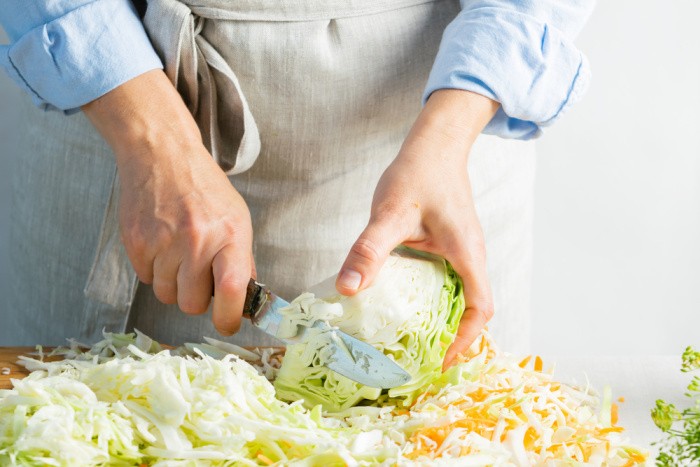
You only need 4-ingredients to make my sauerkraut:
- Shredded cabbage
- Shredded carrots
- Sea Salt
- Water
You can also watch the video on how to do this, here.
Directions for Option Two (this is how I make it)
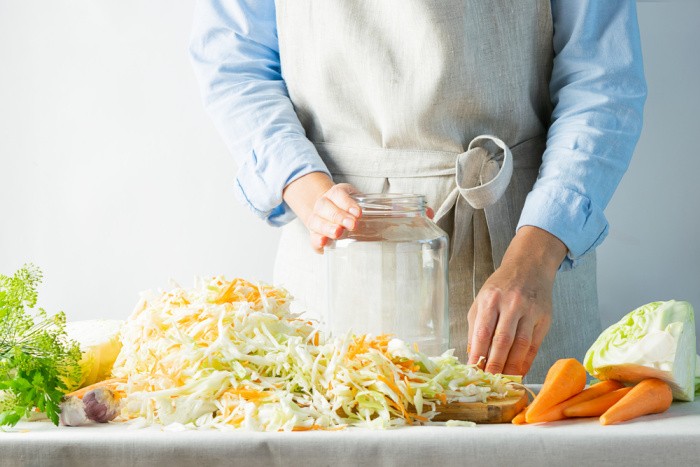
Follow these simple directions to make your own sauerkraut that you can store for up to 4-6 months in your refrigerator.
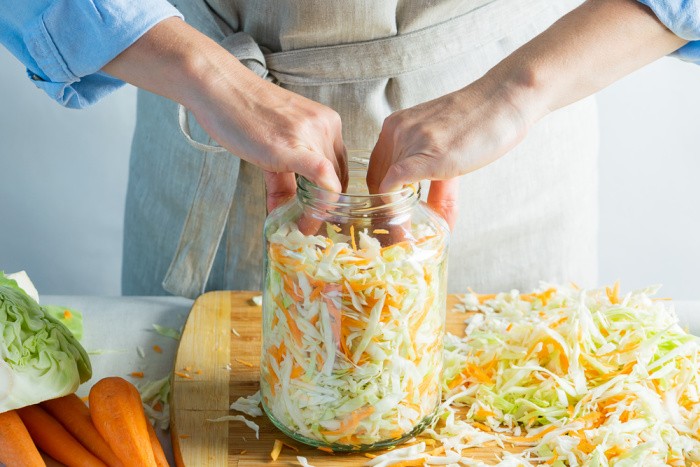
- Shred the cabbage thinly.
- Shred the carrots thinly.
- Add the cabbage and carrots to an airtight jar.
- Sprinkle sea salt on top of the cabbage and carrots in the jar. Redmond Sea Salt is my favorite.
- Cover the mixture with brine water.
- Keep pushing the contents down so it does not dry out, add more brine if needed.
Linda’s Sauerkraut Recipe
How to Stock Sauerkraut
You do want to properly store your sauerkraut so it doesn’t go bad. Due to its acidic nature, it can survive at room temperature for quite some time. While it can survive at room temperature, it is best to keep it in colder temperatures to slow down the fermentation process. During storage, you want to avoid temperature fluctuations and keep it under a constant temperature. I highly recommend storing it in the refrigerator. Better safe than sorry is my motto.
How to Tell if It Has Gone Bad
Unfortunately, sauerkraut can go bad! You don’t want to eat it if it has gone bad. Here are a few signs that it has gone bad and you shouldn’t eat it:
- Off-smelling aroma.
- Weird texture or color.
- Greenish blue specs are on it.
Why You Should Stock Sauerkraut
Final Word
Storing foods that are high in vitamins and nutrients is crucial to our survival. Not getting adequate nutrition, over time, makes us malnourished even if we are eating daily. When we stock sauerkraut, we can use this superfood to balance our nutritional needs. There are other superfoods you can store if you don’t like sauerkraut, such as pomegranate, berries, and garlic. Stock what you typically eat, but also make sure you stock things to keep you healthy and well-nourished. May God Bless this world, Linda
Copyright Images: Sauerkraut Deposit photos_300775952_s-2019, Sauerkraut Deposit photos_300775754_s-2019, Sauerkraut Deposit photos_308479066_s-2019, Sauerkraut Deposit photos_308478900_s-2019, Sauerkraut Deposit photos_142166930_s-2019

No comments:
Post a Comment